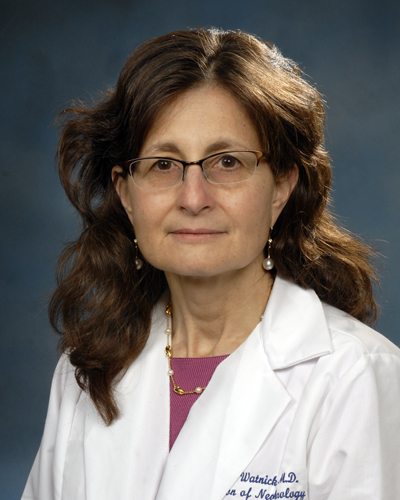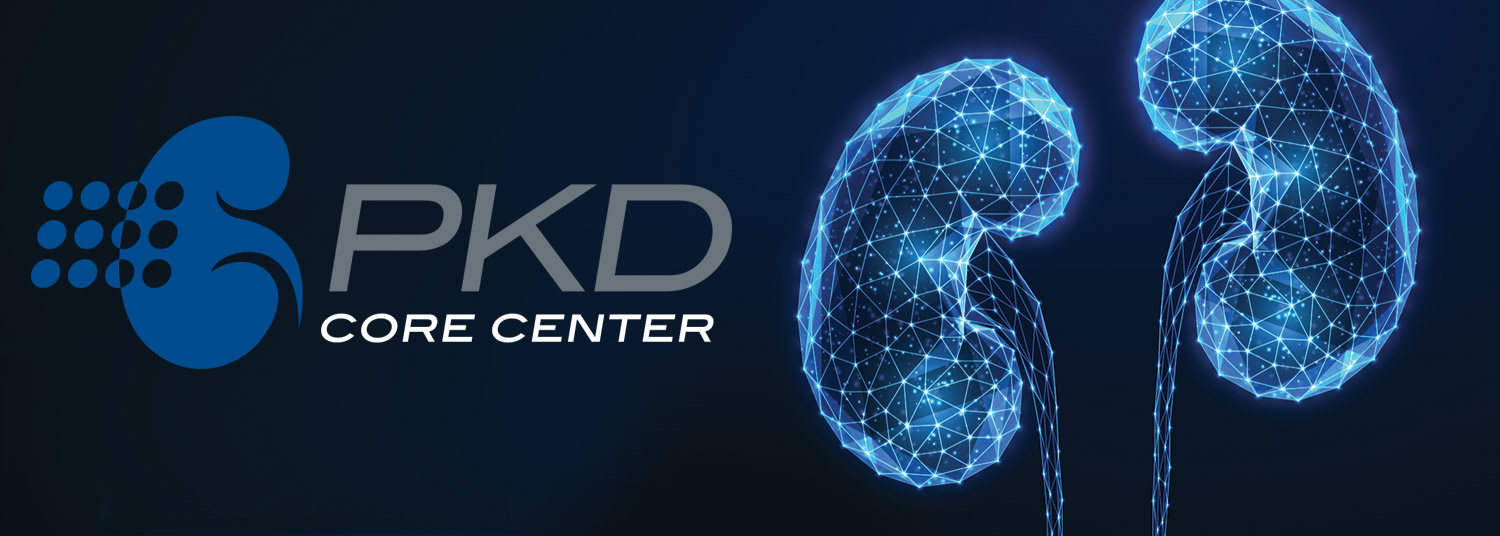February 23, 2023 | January Payne
University of Maryland School of Medicine Center is One of 28 Recognized Nationally
 The PKD Foundation recently recognized the University of Maryland School of Medicine’s (UMSOM) clinical center that treats polycystic kidney disease (PKD) with a highly prestigious “Center of Excellence” designation. The designation recognizes the center as a leader in providing multidisciplinary, comprehensive clinical services for families affected by autosomal dominant polycystic kidney disease (ADPKD), a hereditary condition. It is one of just 28 clinical centers in the U.S.to receive this recognition.
The PKD Foundation recently recognized the University of Maryland School of Medicine’s (UMSOM) clinical center that treats polycystic kidney disease (PKD) with a highly prestigious “Center of Excellence” designation. The designation recognizes the center as a leader in providing multidisciplinary, comprehensive clinical services for families affected by autosomal dominant polycystic kidney disease (ADPKD), a hereditary condition. It is one of just 28 clinical centers in the U.S.to receive this recognition.
The Center of Excellence designation means UMSOM’s PKD clinical center meets certain patient-centered, specialized criteria for the care of ADPKD; this is a common, life-threatening genetic disease that leads to cysts developing on a patient’s kidneys, causing them to enlarge, malfunction and, eventually fail. About 600,000 people in the U.S. have ADPKD, the fourth most common cause of kidney failure in the U.S., affecting all races and ethnicities. Many of these patients eventually require dialysis and kidney transplants.
“This designation shows that we are providing gold-standard care to our patients, including access to an integrated healthcare team, to ongoing research and clinical studies, and to the latest therapeutic advances,” said Terry Watnick, MD, the Joan B. and John H. Sadler Professor in Nephrology, Professor of Medicine at UMSOM, and Director of the newly renamed center – newly renamed the Maryland Polycystic Kidney Disease Clinical Center of Excellence. “We also are able to offer our patients – who live locally and those who travel from other states – a network of nephrologists, specialists, and other providers to meet their comprehensive care needs.”
 In order to achieve this designation, the Maryland Polycystic Kidney Disease Clinical Center of Excellence had to demonstrate a wide-ranging expertise of its staff, including practitioners in the areas of nephrology, radiology, nutrition, hepatology, genetics, and pain management. A “Patient Advisory Panel” also was established to ensure the clinic receives feedback from patients and collaborates with them to provide education and advocacy in the surrounding community. These elements have enabled a center to provide coordination of care for people with ADPKD and to eliminate barriers to timely care.
In order to achieve this designation, the Maryland Polycystic Kidney Disease Clinical Center of Excellence had to demonstrate a wide-ranging expertise of its staff, including practitioners in the areas of nephrology, radiology, nutrition, hepatology, genetics, and pain management. A “Patient Advisory Panel” also was established to ensure the clinic receives feedback from patients and collaborates with them to provide education and advocacy in the surrounding community. These elements have enabled a center to provide coordination of care for people with ADPKD and to eliminate barriers to timely care.
The PKD Foundation’s selection of the UMSOM clinic demonstrates for the importance for giving patients access to high-quality care in a patient-centered environment. It also underscores the emphasis placed on medical research to address this condition, which could ultimately provide better treatments, and even a potential cure, for ADPKD.
“We need to address a multitude of factors, including access to an experienced multi-disciplinary team of physicians and the opportunity to participate in clinical trials, to ensure that patients with this hereditary disease get access to state-of-the-art care,” said UMSOM Dean Mark T. Gladwin, MD, Vice President for Medical Affairs, University of Maryland, Baltimore, and the John Z. and Akiko K. Bowers Distinguished Professor. “Currently there is only one FDA-approved treatment for ADPKD, so pre-clinical studies focused on dissecting the pathophysiology of cyst formation and testing of new compounds targeting metabolic pathways will hopefully accelerate the development of new treatments and better diagnostic tools.”
For Patients:
To learn more about multidisciplinary care for patients with PKD at the University of Maryland Medical Center, visit umm.edu/pkd, or contact 410-328-5720.
About the University of Maryland School of Medicine
Now in its third century, the University of Maryland School of Medicine was chartered in 1807 as the first public medical school in the United States. It continues today as one of the fastest growing, top-tier biomedical research enterprises in the world -- with 46 academic departments, centers, institutes, and programs, and a faculty of more than 3,000 physicians, scientists, and allied health professionals, including members of the National Academy of Medicine and the National Academy of Sciences, and a distinguished two-time winner of the Albert E. Lasker Award in Medical Research. With an operating budget of more than $1.3 billion, the School of Medicine works closely in partnership with the University of Maryland Medical Center and Medical System to provide research-intensive, academic, and clinically based care for nearly 2 million patients each year. The School of Medicine has nearly $600 million in extramural funding, with most of its academic departments highly ranked among all medical schools in the nation in research funding. As one of the seven professional schools that make up the University of Maryland, Baltimore campus, the School of Medicine has a total population of nearly 9,000 faculty and staff, including 2,500 students, trainees, residents, and fellows. The combined School of Medicine and Medical System (“University of Maryland Medicine”) has an annual budget of over $6 billion and an economic impact of nearly $20 billion on the state and local community. The School of Medicine, which ranks as the 8th highest among public medical schools in research productivity (according to the Association of American Medical Colleges profile) is an innovator in translational medicine, with 606 active patents and 52 start-up companies. In the latest U.S. News & World Report ranking of the Best Medical Schools, published in 2021, the UM School of Medicine is ranked #9 among the 92 public medical schools in the U.S., and in the top 15 percent (#27) of all 192 public and private U.S. medical schools. The School of Medicine works locally, nationally, and globally, with research and treatment facilities in 36 countries around the world. Visit medschool.umaryland.edu
Contact
January Payne
Director of Public Relations
Office of Public Affairs & Communications
c: 443-203-8183
e: january.payne@som.umaryland.edu
t: @januarypayne
Related stories

Tuesday, November 23, 2021
University of Maryland Medicine to Eliminate Race from Kidney Function Estimates
University of Maryland Medicine, comprised of the University of Maryland Medical System (UMMS) and the University of Maryland School of Medicine (UMSOM) has announced that it will end the use of a long-standing clinical standard that factors a patient’s race into the diagnosis of chronic kidney disease (CKD). The change could increase access to specialty care, including eligibility for kidney transplantation for thousands of African American people living with advanced kidney disease.

